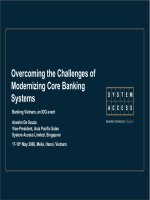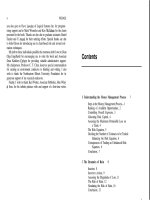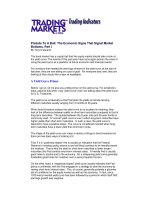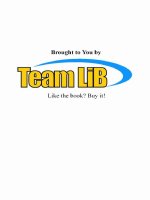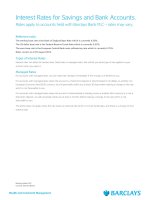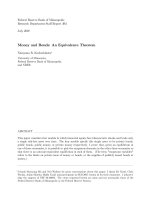THE MONEY ADVICE SERVICE - Basic bank accounts doc
Bạn đang xem bản rút gọn của tài liệu. Xem và tải ngay bản đầy đủ của tài liệu tại đây (540.33 KB, 20 trang )
Basic bank
accounts
The Money Advice Service is here to
help you manage your money better.
We provide clear, unbiased advice to
help you make informed choices.
We try to ensure thatthe information and advice in this guide is correct
at time of print. For up-to-date information and money advice please
visit our website – moneyadviceservice.org.uk.
moneyadviceservice.org.uk 1
Contents
How basic bank
accounts work
2
Key things to
think about
4
Different types of
basic bank account
6
Your questions
answered
8
If things go wrong 11
Jargon buster 13
Useful contacts 15
This guide is for you if you want or need a bank
account to help you manage your money, but
aren’t able to have a current account.
When you read it you will know:
■
how basic bank accounts work
■
how to get one, and
■
what to do if things go wrong.
About this guide
2
How basic bank
accounts work
A basic bank account allows you
to receive money and pay bills.
For many people, it can be a first step
towards opening a current account
later on.
See the Jargon buster on page 13 for
an explanation of some words you may
come across.
With a basic bank account you can:
■
have your wages, benefits, State
Pension or tax credits paid directly
into your account
■
pay in sterling cheques for free (you
will have to wait four business days
before the money is available for you
to spend)
■
take money out at cash machines
in the UK with a cash card. This is
usually free, but some bank cash
machines make a charge. Some
convenience cash machines such as
those inside small shops, on garage
forecourts and in nightclubs may
also charge you each time you
withdraw money from them
■
take money out at the Post Office
®
,
and
■
pay your bills by Direct Debit.
Some banks let you have a debit card
to pay for your shopping and some let
you pay your bills by standing order.
Most let you take money out, pay
money in or check your balance at
bank counters – see the table on
page 6 for full details.
What to expect when you
open a basic bank account
If you want to open a basic bank
account and you meet the bank or
building society’s conditions, you
should generally be allowed to open
one. But there may be reasons why
the bank or building society will not let
you open an account (see the table
on page 6).
Proving your identity
The law says that banks and building
societies have to identify new
customers. This is to help stop criminal
activities like money laundering. They
will explain which documents they will
accept – see page 10.
Running a credit check
on you
If the bank or building society needs to
carry out a full credit check (rather than
an enquiry) on you, it should tell you this
and whether this may have an impact
on your future ability to apply for credit.
moneyadviceservice.org.uk 3
If your application is
turned down
If your application for a basic bank
account is turned down, you are
entitled to ask why. The bank or
building society should tell you (unless
there are exceptional circumstances
such as suspicion of fraud or money
laundering).
Got a question about
money?
From budgeting to borrowing, from
savings to pensions, our trained Money
Advisers can help you with your
questions. We offer free unbiased
information and advice which means
we won’t sell you anything. You can
get this in print, online, over the phone
and face to face.
We also provide tailored advice to
help you make choices at key points
throughout your life whatever your
circumstances. Take our new online
health check. Answer some
straightforward questions and get your
personal action plan to help you with
your money must-do’s and longer-term
goals.
Call us on 0300 500 5000 or go online
at moneyadviceservice.org.uk/
healthcheck.
Key points
With a basic bank account you:
■
don’t get a cheque book
■
don’t get an overdraft
■
can pay in sterling cheques
for free
■
can take money out at cash
machines, and
■
can pay bills by Direct Debit
or standing order.
4
The Financial Services Authority
(FSA), the UK’s financial services
regulator, is responsible for
regulating many aspects of how
your bank or building society
does business with you.
This means banks and building
societies have to meet certain
standards, which the FSA monitors,
and it can take action if they don’t.
You can also expect them to make
you aware of certain information and
provide a prompt, efficient and fair
service. For more information see the
FSA’s online leaflet Bank accounts:
Know your rights at www.fsa.gov.uk/
bankingrights or get our Your bank
account guide – see Useful contacts
on page 15.
Running your account
One of the most important things you
do with your bank account is to make
and receive payments. Most people
have money going in – such as wages,
allowance, benefits, cash or cheques
and money going out – such as
standing orders, Direct Debits or
withdrawing cash.
Your bank or building society must
give you certain information about the
payments you make or receive. It will
tell you what information it needs to
send or receive payments.
Be very careful that you give the
bank or building society or someone
who owes you money the correct
information, for example, the sort code
or account number. They may not be
liable if you give the wrong details and
the money goes to the wrong place.
Key things to
think about
moneyadviceservice.org.uk 5
When choosing a
basic bank account:
Check
you can use cash machines near where you live or
work for free (ask the bank or building society if you
aren’t sure).
Check
there is a branch of the bank/ building society
near you where you can pay in money and check
on your account.
Check
you can pay money in or get money out at a
Post Office
®
branch, if this is important for you.
Check
you will get the services you need like a debit card,
Direct Debits or standing orders.
moneyadviceservice.org.uk 5
6
Different types of basic bank account
This table shows which banks and building societies offer basic
bank accounts and what services you can expect to get.
Bank name and any special
name for the account
Minimum
age to
open an
account
Free buffer
zone (see
page 13)
Direct
Debits and
standing
orders
1
Charge for unpaid
Direct Debit
2
or
standing order
Debit card
(Solo,
Electron,
Maestro or
Visa debit)
Bank branch
counter access
Post Office
®
branch access
Free
access to
bank cash
machines
(ATMs) in
the UK
If any of the following
apply to you, your
application may be declined
Bank of Ireland UK: Basic Cash
Account (only available in Northern Ireland)
16 No Yes £42
4
No Yes Yes Yes Undischarged bankrupt,
record of fraud
Bank of Scotland: Cash Account 16 £10 Yes £10
(max 3 per day)
Visa debit Yes (withdrawals
over £300 only)
Yes No, own
ATMs only
Undischarged bankrupt,
record of fraud
Barclays: Cash Card Account 18
3
No Yes £8 Visa debit Yes Withdrawals
only
Yes Record of fraud
Clydesdale: Readycash 16 No Yes £35 Maestro Yes Yes Yes Undischarged bankrupt,
record of fraud
Co-operative Bank: Cashminder 16 No Yes £15
4
Visa debit Yes Yes Yes Record of fraud
First Trust Bank:
Basic Bank Account
16 £10 Direct
Debits only
£35 No No Yes (except
deposits)
No, own
ATMs only
Undischarged bankrupt, record
of fraud, record of bad debts
Halifax: Easycash 16 £10 Yes £10
(max 3 per day)
Electron Yes (withdrawals
over £300 only)
Yes (except
deposits)
Any LINK
machine
Undischarged bankrupt,
record of fraud
HSBC: Basic Bank Account 18 £10 Yes No
4
No Yes (except
withdrawals)
Withdrawals
only
Yes Undischarged bankrupt,
record of fraud
Lloyds TSB: Cash Account 18
3
£10 Yes £10
(max 3 per day)
Visa debit Yes Yes No, own
ATMs only
Undischarged bankrupt,
record of fraud
Nationwide Building Society:
Flex Cash Card
18
3
No Yes £15 Visa debit Yes (withdrawals
over £100)
5
Yes (except
deposits)
Yes Undischarged bankrupt,
record of fraud
NatWest: Basic Account 18 £6 Yes £6 (max £60 in any
charging period)
Visa debit Yes Yes No, own
ATMs only
Undischarged bankrupt,
record of fraud
Northern Bank:
Northern Personal Access
14 No Yes No Maestro Yes Withdrawals
only
Yes Undischarged bankrupt, record
of fraud, record of bad debts
Santander: Basic Current Account 16 No Yes £25 No Yes (withdrawals
over £300 only)
Withdrawals
only
Yes Undischarged bankrupt,
record of fraud
The Royal Bank of Scotland:
Basic Account
18 £6 Yes £6 (max £60 in any
charging period)
Visa debit Yes Yes No, own
ATMs only
Undischarged bankrupt,
record of fraud
Ulster Bank: Step Account 18 No Yes £10 (max £100 in any
charging period)
Visa debit Yes Yes (except
deposits)
Yes Undischarged bankrupt,
record of fraud
Yorkshire Bank: Readycash 16 No Yes £35 Maestro Yes Yes (except
deposits)
Yes Undischarged bankrupt,
record of fraud
Explanatory notes
1 A bank may cancel a standing order or Direct Debit if, more than once, you don’t have enough
money in your account to pay it.
2 Correct at time of print but always check with the bank or building society.
3 16 and 17 year-olds can open a similar account.
4 The account may be closed if any Direct Debit or standing order is refused three times.
5 No balance enquiries or printed ‘mini statements’ and only Nationwide bills can be paid.
moneyadviceservice.org.uk 7
All these accounts accept Automated Credit Transfer (ACT) payments, offer cash
withdrawals at the Post Office
®
, and a cash-machine card. None of them offer a cheque
book or ask for a minimum amount to open an account.
Bank name and any special
name for the account
Minimum
age to
open an
account
Free buffer
zone (see
page 13)
Direct
Debits and
standing
orders
1
Charge for unpaid
Direct Debit
2
or
standing order
Debit card
(Solo,
Electron,
Maestro or
Visa debit)
Bank branch
counter access
Post Office
®
branch access
Free
access to
bank cash
machines
(ATMs) in
the UK
If any of the following
apply to you, your
application may be declined
Bank of Ireland UK: Basic Cash
Account (only available in Northern Ireland)
16 No Yes £42
4
No Yes Yes Yes Undischarged bankrupt,
record of fraud
Bank of Scotland: Cash Account 16 £10 Yes £10
(max 3 per day)
Visa debit Yes (withdrawals
over £300 only)
Yes No, own
ATMs only
Undischarged bankrupt,
record of fraud
Barclays: Cash Card Account 18
3
No Yes £8 Visa debit Yes Withdrawals
only
Yes Record of fraud
Clydesdale: Readycash 16 No Yes £35 Maestro Yes Yes Yes Undischarged bankrupt,
record of fraud
Co-operative Bank: Cashminder 16 No Yes £15
4
Visa debit Yes Yes Yes Record of fraud
First Trust Bank:
Basic Bank Account
16 £10 Direct
Debits only
£35 No No Yes (except
deposits)
No, own
ATMs only
Undischarged bankrupt, record
of fraud, record of bad debts
Halifax: Easycash 16 £10 Yes £10
(max 3 per day)
Electron Yes (withdrawals
over £300 only)
Yes (except
deposits)
Any LINK
machine
Undischarged bankrupt,
record of fraud
HSBC: Basic Bank Account 18 £10 Yes No
4
No Yes (except
withdrawals)
Withdrawals
only
Yes Undischarged bankrupt,
record of fraud
Lloyds TSB: Cash Account 18
3
£10 Yes £10
(max 3 per day)
Visa debit Yes Yes No, own
ATMs only
Undischarged bankrupt,
record of fraud
Nationwide Building Society:
Flex Cash Card
18
3
No Yes £15 Visa debit Yes (withdrawals
over £100)
5
Yes (except
deposits)
Yes Undischarged bankrupt,
record of fraud
NatWest: Basic Account 18 £6 Yes £6 (max £60 in any
charging period)
Visa debit Yes Yes No, own
ATMs only
Undischarged bankrupt,
record of fraud
Northern Bank:
Northern Personal Access
14 No Yes No Maestro Yes Withdrawals
only
Yes Undischarged bankrupt, record
of fraud, record of bad debts
Santander: Basic Current Account 16 No Yes £25 No Yes (withdrawals
over £300 only)
Withdrawals
only
Yes Undischarged bankrupt,
record of fraud
The Royal Bank of Scotland:
Basic Account
18 £6 Yes £6 (max £60 in any
charging period)
Visa debit Yes Yes No, own
ATMs only
Undischarged bankrupt,
record of fraud
Ulster Bank: Step Account 18 No Yes £10 (max £100 in any
charging period)
Visa debit Yes Yes (except
deposits)
Yes Undischarged bankrupt,
record of fraud
Yorkshire Bank: Readycash 16 No Yes £35 Maestro Yes Yes (except
deposits)
Yes Undischarged bankrupt,
record of fraud
Last updated: November 2011
This information is correct as at time of print, but is subject to change.
Please check with your chosen bank or building society.
(balance, deposits
and withdrawals)
8
Your questions
answered
Question:
What information will
I get about a basic bank
account?
Answer:
If a bank or building society offers a
basic bank account, it should give you
details about the account, its features
and how you can open one.
It will also give you details about what
to do if things go wrong and the
compensation arrangements that apply
if it goes out of business – see page 11.
Question:
How do I keep track of my
money with a basic bank
account?
Answer:
You will get a regular statement in the
post showing what money has been
paid in and what has gone out.
With most basic bank accounts you
can check how much money you
have and get a mini statement from
a cash machine showing the most
recent transactions.
Most accounts will also let you check
your balance at a Post Office
®
. And
with some you can check your
balance online.
moneyadviceservice.org.uk 9
Question:
What if there isn’t enough
money in my account to
pay my Direct Debit or
standing order?
Answer:
You can’t usually go overdrawn with a
basic bank account by more than £10,
if at all. If you pay your bills by Direct
Debit or standing order and there isn’t
enough money in your account, then
the bank will not make the payment
(it will notify you). You may be charged a
fee or the bank may cancel your Direct
Debit or standing order, or even close
your account – see page 6.
You will still have to pay the bill as well
as any charge. It is really important to
make sure you have enough money
in your account to pay your bills.
Question:
What happens if I only
have £6 left in my
account and the cash
machine only gives
£10 notes?
Answer:
If your account has a buffer zone,
the machine will let you have £10 even
if there is only £6 in your account.
The bank will not charge you for going
overdrawn up to the buffer-zone limit.
If it doesn’t have a buffer zone, you
won’t be able to take out £6.
You can take out the exact amount of
money you have in your account over the
counter at your bank or building society
or at a Post Office
®
branch.
10
Question:
What proof will I need
to open an account?
Answer:
The law says that banks and building
societies have to identify their new
customers. This is to help stop criminal
activities like money laundering. They
will explain which documents they
will accept as proof of your identity,
although this may vary from one bank
or building society to another.
They may ask you for a government-
issued document:
■
with a photograph – such as a valid
passport, or
■
without a photograph such as a valid
old-style driving licence – plus another
document from an approved source.
If you don’t have these documents,
they may accept other documents
such as:
■
a letter from a government
department or local council
confirming your right to benefits
■
suitable information of identity from
a young person’s workplace or
educational institution, or
■
a letter from a care-home manager
or warden of sheltered
accommodation or a refuge.
Further options may be available if you
are an international student, migrant
worker, refugee, asylum seeker,
prisoner or on probation. You can use
the tables on our website to compare
identity requirements for basic bank
accounts – see moneyadviceservice.
org.uk/idforbasicbankaccounts.
Toynbee Hall’s ID Handbook – How to
prove your identity has more
information on the different documents
that you can use to prove your identity
– see Useful contacts on page 15.
Question:
I don’t think I could use
Chip and PIN – is there
an alternative?
Answer:
If you can’t manage Chip and PIN, ask
if you can use Chip and Signature or a
rubber stamp instead.
moneyadviceservice.org.uk 11
If things
go wrong
Mistakes can happen, but there
are things you and your bank or
building society can do to put
things right.
If you have a complaint about the
service you receive, you should first
contact the bank or building society
to enable them to resolve the matter.
The firm should investigate your
complaint and reply within eight weeks,
with either an initial answer or their
final response.
If you’re not satisfied with their
response, you may be able to take your
complaint to the Financial Ombudsman
Service. The bank or building society
must give you details of this free service.
For more information get a copy of our
Complaints about banking services
leaflet – see Useful contacts on page 15.
Compensation
If a UK-authorised financial services
firm is unable, or likely to be unable, to
pay claims against it, you may be able
to get compensation from the Financial
Services Compensation Scheme
(FSCS) – see Useful contacts.
12
Next steps
Step 1
Decide which basic bank account would be best for
you. Use the table on page 6 and think about the
points on page 5 to help you decide.
Step 2
Be ready to prove to the bank or building society that
you are who you say you are. If you have difficulty
proving your identity, the member of staff dealing
with your application can usually refer the matter to
someone who is authorised to decide in exceptional
circumstances.
Step 3
If you want to have your wages, State Pension or tax
credits paid directly into your account, talk to your
wages office or the pension or benefit office dealing
with your claim.
Step 4
To set up a Direct Debit or standing order to pay
household or other regular bills, ask the company for
a Direct Debit or standing order form. Direct Debit
forms are returned to the company that you want to
pay, but you give a standing order form to your bank.
12
moneyadviceservice.org.uk 13
Jargon buster
Automated Credit
Transfer (ACT)
Payment of wages, benefits, pensions
and tax credits directly into a bank or
building society account.
Balance
The total amount of money in
your account.
Buffer zone
A small amount of credit that a bank
may give you, so you can get money
from a cash machine even if you don’t
have enough money in your account.
Cashback
A service that allows you to get cash
from your account in supermarkets or
other shops, using your basic bank
account debit card.
Cash card
A card you can use to check your
balance or withdraw cash from your
account at cash machines or Post
Office
®
branches. You cannot use a
cash card to pay for goods or services.
Chip and PIN
The name for using a personal
identification number to authorise
payment from your account.
Credit check
A search of your borrowing record, also
known as your credit history. A bank or
other organisation carries out a credit
check on a person when deciding
whether to lend them money or to
open a bank account in their name.
Debit card
A card issued by a bank that you use
to withdraw cash or to pay for your
shopping. The money is usually taken
from your account immediately.
Some key words and phrases explained.
14
Direct Debit
A way of paying bills from your bank
account. You sign a form allowing the
company you are paying to take the
money directly from your account on
specific dates.
They then take the money from your
account automatically on the agreed
dates. They have to notify you in
advance before changing the amount
or the dates of the payments.
Interest
A charge for borrowing money, or a
reward for saving money. It is usually
shown as a percentage of the amount
borrowed or saved.
Money laundering
The process criminals go through to
disguise and hide the money made
from their crimes.
Overdraft
A facility allowing you to spend more
money from your account than you
have in it. The bank will usually charge
you interest if this happens, and
sometimes other fees as well. You
don’t get an overdraft with your
basic bank account.
Standing order
A way of paying bills from your bank
account. You sign a form sent to you
by the company you are paying. This
sets out the amount to be paid and the
payment dates. You then give this
to your bank.
The bank pays the amounts from your
account automatically on the agreed
dates to the company you are paying.
You must tell your bank if the amount or
the dates of payment need to change.
Banks that offer standing orders will
allow you to set them up to leave your
account at different times (varying from
annually to daily) – talk to your bank
about what options they offer.
Statement
A detailed list of all payments in and out
of your account over a period of time,
for example, one month. Ask your bank
how often it sends statements.
Undischarged bankrupt
A person who cannot pay their debts
and is still on the bankruptcy register.
moneyadviceservice.org.uk 15
Useful contacts
Money Advice Service
For advice based on your own
circumstances or to order other guides
Money Advice Line: 0300 500 5000
Typetalk: 1800 1 0300 500 5000
Calls should cost no more than 01 or 02
UK-wide calls, and are included in inclusive
mobile and landline minutes. To help us
maintain and improve our service, we
may record or monitor calls.
Other Money Advice Service guides
■
Borrowing Money
■
Complaints about banking services
■
Credit unions
■
Making a complaint
■
Making the most of your money
■
Making your budget work for you
■
Your bank account
For more titles, call us or go to
moneyadviceservice.org.uk/
publications
On our Money Advice Service
website you can find:
■
a budget planner to help you work
out if you have enough money
coming in to cover your bills
■
comparison tables to help you
compare products like savings
accounts and mortgages, and
■
a health check to help you build
up some good financial habits and
reach your goals.
Go to moneyadviceservice.org.uk/
interactive
Call rates to the following
organisations may vary – check
with your telephone provider.
Financial Services Authority (FSA)
To check the FSA Register, or to
report misleading financial adverts
or promotions.
Online leaflet: Bank accounts: Know
your rights
Consumer helpline: 0845 606 1234
Minicom/textphone: 0845 730 0104
www.fsa.gov.uk/
consumerinformation
16
Organisations that can
help you if you have
money problems
Advice UK
All members provide free and
confidential advice on a range of
subjects, but not all provide
money advice.
020 7469 5700
www.adviceuk.org.uk
advice4debtNI
Offers free, confidential and
independent debt and money advice
to anyone in Northern Ireland who is
affected by debt or money worries.
0800 917 4607
www.advice4debtni.com
Citizens’ Advice Bureaux (CABx)
Offers free, confidential and face to face
money advice. Look in the
Phone Book or on its website for
your local bureau.
www.adviceguide.org.uk
Consumer Credit Counselling
Service (CCCS)
Offers a structured programme of
advice on how to manage your money.
0 80 0 13 8 1111
www.cccs.co.uk
Credit Action
Works in partnership with the CCCS
and publishes factsheets about debt
and budgeting.
www.creditaction.org.uk
Money Advice Scotland
Provides details of advice agencies
throughout Scotland that provide
a free, independent, impartial and
confidential advice service.
0141 572 0237
www.moneyadvicescotland.org.uk
National Debtline
Provides a free, confidential and
independent telephone advice service.
0808 808 4000
www.nationaldebtline.co.uk
Payplan
Free confidential advice on
debt problems.
0800 716 239
www.payplan.com
moneyadviceservice.org.uk 17
Other helpful contacts
Toynbee Hall
ID Handbook – How to prove your
identity
020 7247 6943
www.transact.org.uk/shared/get-file.
ashx?id=483&itemtype=document
The Post Office
®
To find your nearest Post Office
®
branch.
08457 223344
www.postoffice.co.uk
British Bankers’ Association (BBA)
Leaflets to view or download:
Banking for people who lack capacity
to make decisions
International students:
Opening a bank account
Opening a bank account if you are
new or returning to the UK
www.bba.org.uk
Complaints and
compensation
Financial Ombudsman Service
South Quay Plaza
183 Marsh Wall
London E14 9SR
0800 023 4567 or 0300 123 9123
www.financial-ombudsman.org.uk
Financial Services Compensation
Scheme (FSCS)
7th Floor Lloyds Chambers
Portsoken Street
London E1 8BN
0800 678 1100 or 020 7741 4100
www.fscs.org.uk
All our guides are available from:
Our website
moneyadviceservice.org.uk
Money Advice Line
0300 500 5000
This guide is part of our
everyday money series.
Other titles in this series include:
■
Making the most of your money
■
Your bank account
■
Getting financial advice
If you would like this guide
in Braille, large print or audio
format, please call us on
0300 500 5000 or Typetalk
on 1800 1 0300 500 5000.
Calls should cost no more than 01 or 02
UK-wide calls, and are included in inclusive
mobile and landline minutes. To help us
maintain and improve our service, we
may record or monitor calls.
December 2011
© Money Advice Service December 2011 Ref: VRSN0012c

